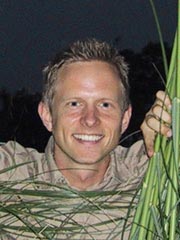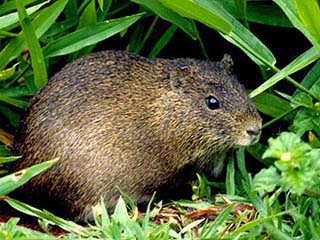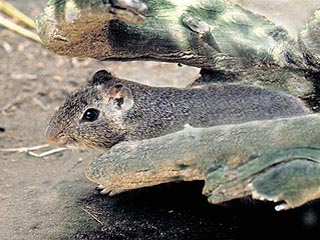 |
Dipl.-Biol.
Matthias Asher Badestr. 9 D-48149 Muenster Fax: +49 (0)251-8323896 |
Present
position
Research
interests
Evolution of
social and mating systems of neotropical rodents
In
My current
research is focussed on the evolution of social and mating systems in
the
Caviinae, the true guinea pigs. I am conducting field studies on
closely
related species of wild guinea pigs which inhabit ecologically
different
habitats to determine the ultimate factors that have shaped the
evolution of
their divergent social and mating systems.
 |
 |
|
| Wild cavy (Cavia aperea) | Yellow-toothed cavy (Galea musteloides) |
I study
natural
populations of wild cavies (Cavia aperea)
in
 |
 |
 |
 |
| Life trapping |
Individual marking | Radio telemetry | DNA fingerprinting |
By investigating the impact of different ecological factors like the habitat structure, food availability and predation risk on the development of divergent social and mating systems within the Caviinae I am attempting to reveal general rules for the social evolution of rodents.
Publications
Asher,
M., Schrameyer, T.,
Epplen, J. T., Kraus, C. Trillmich, F. & Sachser, N. (in
preparation): Social and
mating
system of the wild cavy (Cavia aperea)
in its natural habitat.
Asher,
M., Oliveira, E. S.
& Sachser, N. (in press):
Social system and spatial organization of wild guinea pigs (Cavia
aperea)
in a natural low density population. Journal
of Mammalogy.
Trillmich,
F., Kraus, C.
Künkele, J., Asher, M., Clara, M., Dekomien, G., Epplen, J. T.,
Saralegui, A.
& Sachser, N. (2004): Species
level differentiation of two
cryptic species pairs of wild cavies, genera Cavia and Galea,
with a discussion of the relationship between social systems and
phylogeny in
the Caviinae. Canadian Journal of
Zoology 82:
516–524.
Special
publications,
conference proceedings and book chapters
Asher,
M. & Sachser, N.
(in
press):
Divergent
social and mating systems of wild cavies
in their natural habitats. In: Contributions
to the 2nd
European Conference on Behavioural Biology, Groningen.
Asher,
M. & Sachser, N.
(in
press):
Of
machos and hippies - strongly contrasting
breeding systems in two closely related species of wild guinea pigs. In: Contributions
to the 10th
International
Behavioral
Ecology Congress, Jyvaskyla.
Asher,
M. (2004):
The evolution of social and mating systems in the Caviinae (Rodentia).
In: Co-Evolution 2004. Contributions to
the 9th
Graduate student
meeting of the evolutionary biology section of the Deutsche Zoologische
Gesellschaft, Muenster: 12.
Asher,
M. (2003): Social
organization of wild guinea pigs in their natural habitats. In: Contributions
to the 5th Graduate
student meeting of the Ethologische Gesellschaft and the Deutsche
Zoologische
Gesellschaft,
Asher,
M. & Sachser, N.
(2003): Different forms of social
organization in closely
related species of wild guinea pigs. In: Contributions
to the XXVIII International Ethological Conference,
Florianópolis, Revista de Etologia 5,
Supplement I: 21
Asher,
M. & Sachser, N.
(2002): Social system and habitat
use in a population of wild
cavies (Cavia aperea). In: Contributions to the 1st
European Conference on Behavioural Biology, Muenster: 4.
Asher,
M. & Sachser, N.
(2002): Habitat use and social
structure of wild guinea pigs
under natural conditions. In: 95th
annual meeting of the Deutsche Zoologische Gesellschaft,
Asher,
M. & Sachser, N.
(2001): Social system and spatial
organisation of the wild
guinea pig (Cavia aperea) in its natural habitat. In: Libro
de
resúmenes, XVI Jornadas
Asher,
M. & Sachser, N.
(2001): Habitat use and social
structure of wild guinea pigs
under natural conditions. In: Contributions
to the XXVII International Ethological Conference, Tuebingen, Advances in Ethology 36.
Supplements to Ethology: 117.
Wölbing,
O., Asher, M., Bishr,
Y., Kuhn, W., & Sachser, N. (2000): Applying GIS
for investigations in behavioral biology. In: Strobl,
J., Blaschke, T. & Griesebner, G. (Eds.): Angewandte
Geographische Informationsverarbeitung XII. Beitraege zum
AGIT-Symposium
Salzburg 2000. Heidelberg, Wichmann Verlag: 520-528.
Asher,
M. & Sachser, N.
(2000): Social structure and
habitat selection of wild guinea
pigs (Cavia aperea) under natural
conditions. In: Contributions to the 8th
International
Behavioral
Ecology Congress, Zuerich: 12.
Asher,
M. & Sachser, N.
(2000): Habitat selection and
social system in a population of
wild guinea pigs (Cavia aperea) under
natural conditions. In: 93rd
annual meeting of the Deutsche Zoologische Gesellschaft,
Asher,
M. (2000): Soziale
Organisation und Habitatnutzung des Wildmeerschweinchens (Cavia
aperea)
im natuerlichen Lebensraum. Mitteilungsblatt der Ethologischen
Gesellschaft
44: 41.
Touma,
C., Asher, M. &
Sachser, N. (1998): Social structure in a
group of Vietnam Sika deer
in the Allwetterzoo Muenster. In: Contributions
to the 2nd International Symposium on
Physiology and
Ethology of
Wild and Zoo Animals, Berlin, Advances
in Ethology 33, Supplements to Ethology: 45.
Talks
and posters
Scientific
talks
Asher,
M. & Sachser, N.
(Jul/2004):
Of
machos and hippies - strongly contrasting
breeding systems in two closely related species of wild guinea pigs. 10th
International
Behavioral
Ecology Congress, Jyvaskyla (Finland).
Asher,
M. (Feb/2004): The evolution of
social and
mating systems in the Caviinae (Rodentia). Co-Evolution
2004. 9th
Graduate
student
meeting of the evolutionary biology section of the Deutsche Zoologische
Gesellschaft, Muenster (
Asher,
M. (Dec/2003): Von Machos und
Hippies -
unterschiedliche Sozialsysteme wilder Meerschweinchenarten in ihrem
natuerlichen
Lebensraum. Department of Animal
Physiology,
Asher,
M. (Oct/2003): Social organization of
wild
guinea pigs in their natural habitats. 5th
Graduate student meeting of the Ethologische Gesellschaft and the
Deutsche
Zoologische Gesellschaft,
Asher,
M. & Sachser, N. (Aug/2003): Different forms of
social
organization in closely related species of wild guinea pigs. XXVIII
International Ethological Conference, Florianópolis (
Asher,
M. & Sachser, N. (May/2002): Habitat use and
social structure
of wild guinea pigs under natural conditions. 95th
Annual Meeting
of the Deutsche Zoologische Gesellschaft,
Asher,
M. (Mar/2002): Sistema social y
organisación
espacial
Asher,
M. & Sachser, N. (Nov/2001): Social system and
spatial
organisation of the wild guinea pig (Cavia aperea) in its
natural
habitat. XVI Jornadas Argentinas de Mastozoología,
Asher,
M. & Sachser, N. (Aug/2001): Habitat use and
social structure
of wild guinea pigs under natural conditions. XXVII International
Ethological Conference, Tuebingen (
Asher,
M. (Mar/2001): Comparative analysis
of the
social and mating systems of closely related neotropical rodent species
in
their natural habitats. Instituto
Argentino de Investigaciones de las Zonas Áridas,
Asher,
M. (Aug/2000): Soziale Organisation
und Habitatnutzung
des Wildmeerschweinchens (Cavia aperea) im natuerlichen
Lebensraum.
Department of Animal Behaviour,
Scientific
posters
Asher,
M. & Sachser, N.
(forthcoming):
Divergent
social and mating systems of wild cavies
in their natural habitats. 2nd
European Conference on Behavioural Biology, Groningen (Netherlands).
Asher,
M. (2003): Social
and mating systems of wild guinea pigs. Graduate student meeting of
the
Evangelisches Studienwerk, Villigst (
Asher,
M. & Sachser, N.
(2002): Social system and habitat
use in a population of wild
cavies (Cavia aperea). 1st
European Conference on
Behavioural Biology, Muenster (
Asher,
M. & Sachser, N.
(2000): Social structure and
habitat selection of wild guinea
pigs (Cavia aperea) under natural
conditions. 8th International Behavioral
Ecology
Congress, Zuerich
(
Asher,
M. & Sachser, N.
(2000): Habitat selection and
social system in a population of
wild guinea pigs (Cavia aperea) under
natural conditions. 93rd Annual Meeting
of the Deutsche
Zoologische Gesellschaft,
Touma,
C., Asher, M. &
Sachser, N. (1998): Social structure in a
group of Vietnam Sika deer
in the Allwetterzoo Muenster. 2nd
International
Symposium on
Physiology and Ethology of Wild and Zoo Animals,
Curriculum
vitae
Education
| 2000 - present | PhD student
at
the |
| 1998 - 1999 | Diplom
(equivalent of M.S., summa cum laude) in Biology at
the |
| 1993 - 1999 | Studies in
Biology, Geography and Philosophy at the |
Research experience
| 2002 |
Habitat use of the
Bolivian yellow-toothed cavy (Galea n. spec.) in the
Andean |
| 2001 - 2002 |
Social and
mating system of the yellow-toothed cavy (Galea musteloides)
in the |
| 2000 - 2001 |
Social and
mating system of the wild cavy (Cavia aperea) in the
department of Rocha
( |
| 1998 - 1999 |
Habitat
use and social organisation of the wild cavy (Cavia aperea)
in the state of |
| 1997 |
Social
structure of the |
| 1996 |
Population
ecology and genetics of the Golden ground beetle (Carabus
auronitens) in the Muensterland ( |
Teaching
| 2001 - present | Zookurs -
Saeugetiersozialsysteme
(classes on
mammalian social systems for graduate students), Department of
Behavioural
Biology, |
| 2000 - present | Methoden der
Verhaltensbiologie (classes in
behavioural biology for graduate students), Department of Behavioural
Biology, |
| 1997 - 1998 |
Zoologische Exkursionen
im Muensterland (zoological excursions
for undergraduate students), Department of Zoology and Genetics, |
| 1995 - 1998 |
Zoologische
Bestimmungsuebungen (classes in animal taxonomy
for undergraduate students), Department of Zoology and Genetics, |
Funding
| 2003 -
present |
Scholarship of
the Evangelisches
Studienwerk |
| 2002 |
Scholarship
of the |
| 2000 - 2002 | Travel and
research grant of the German Academic Exchange
Service (DAAD) |
| 1998 - 1999 | Research
grant of the German Science Foundation (DFG) |
Conservation work
| 2004 - present | Consultant for local
groups in North
Rhine-Westphalia of the German Society
for Nature Conservation
(NABU) |
| 2003 - present | Leader of the
photographic division and co-founder of the
media and
public relations group of the German Society for Nature Conservation
(NABU) in
Muenster |
| 1994 - present | Habitat
conservation of the European tree
frog (Hyla arborea) and other endangered
amphibian
species. Wetland conservation group of the German Society for Nature
Conservation
(NABU) in Muenster |
| 1994 | Co-founder
of the wetland conservation group of the German Society for Nature
Conservation
(NABU) in Muenster |
| 1989 - 1993 | Conservation work for
endangered amphibian and bird
species. German Society for Nature
Conservation (NABU) in Hamm |
Special
skills and interests
| Languages | German
(mother tongue) English and Spanish (fluent, spoken and written) French and Portuguese (good proficiency) |
| Computer skills | Geographic Information
Systems (ArcGIS 8.3) Home range analysis (Ranges 6) Digital image processing (Photoshop 7.0) |
| Photography | Nature and
wildlife photography |
| Hobbies | Rowing, volleyball, and
travelling |
Personal
background
Being curious about different cultures, I visited numerous foreign countries during university years. Apart from two trips to
Throughout
my biological studies, I focussed on zoology, and in 1999 I completed
my Diplom
(Master's) on the behavioural ecology of wild guinea pigs (Cavia
aperea),
under supervision of Prof. Dr. Norbert Sachser. The fieldwork
underlying this
study was conducted in
Since 2000, I am PhD
student
at the Department of Behavioural Biology at the
Collaborators
Cornelia Kraus and Fritz Trillmich (
Tanja Schrameyer and Jörg T. Epplen (
Elisabeth Spinelli de Oliveira (Universidade de São Paulo)
Mario Clara (Universidad de la Republica,
(Membership)
Deutsche
Zoologische Gesellschaft (DZG)
Sociedad
Argentina para el Estudio de los Mamíferos (SAREM)
Verband
Deutscher Biologen (vdbiol)
World Wide Fund for Nature
(WWF)